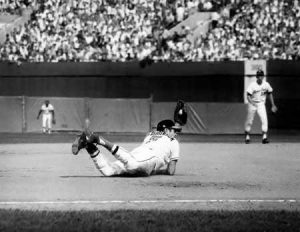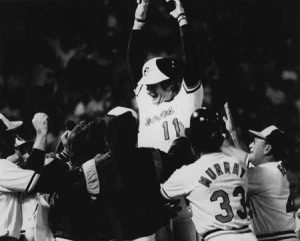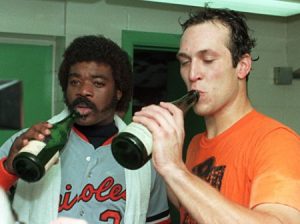Game 10: Like son, like father
Baltimore Orioles vs. Detroit Tigers
Twilight doubleheader
Memorial Stadium, Baltimore, MD
June 23, 1979

One day in the early 70s when I went to pick up my son for the weekend, I noticed that one wall of his bedroom had suddenly sprouted a goodly number of photographs of Brooks Robinson: it was time for me to perform the Dad duty of taking my son to a game. The following season we went to the Sunday game in the Orioles opening series against the Tigers. I had purposely gotten box seats near third base, and the reward came soon: Brooks made a leaping grab over the bag and turned a double into a routine 5-3 putout. My son turned to me, the look on his face so astonished I thought his eyes were going to bug out of his head. And that was that. For the next 10 years, our Sundays (and an occasional night game thrown in) in the summer would frequently be spent at Memorial Stadium
And over that time, I inexorably became an Orioles fan, a process that was accelerated by the new Yankee owner, George Steinbrenner, who I immediately found to be a consummate shitheel (beware the sons of successful men who need to prove they have stones as big as Daddy’s).
I adored Thurman Munson, Ron Guidry, Roy White and Mel Stottlemyre, but I found the daily nastiness of the owner (especially in the dance of death with manager Billy Martin) made being a Yankee fan a chore, rather than a pleasure. And the Orioles, with their professionalism—the “Oriole Way”—were a very appealing group, especially my son’s idol, Brooks Robinson, one of the most decent and modest men to play the game at his level of excellence. By the mid-seventies, I was an Orioles fan.

And, so, too, in time, were many others in the Baltimore area. Even though they fielded good to spectacularly good teams from the early 60s through the 70s, the Orioles did not draw many fans—Baltimore was a football town, a Colts town. But slowly in the late 70s, attendance began to rise, and on the night of June 22nd, 1979, the Orioles at last became the toast of the town when Doug DeCinces hit a three-run homer in the bottom of the ninth to win the game—the stadium went wild, and so did Baltimore. That was all that was talked about the next day. I don’t recall the exact circumstances but a regular at my neighborhood saloon had a block of tickets for that night’s twilight doubleheader; I was invited in, and also scored a ticket for my son. That afternoon, a bunch of us left in a two-car caravan to Baltimore for the games. To put it delicately, all the adults save one were what one might politely call heavy drinkers, and the tone was set just as the National Anthem concluded, when one of our number, a bartender, ordered beers for all of us, gave the beer vendor a 20 buck tip, and suggested he return every inning henceforth, which he did. Sufficiently lubricated, we were treated to two exciting Orioles victories. Improbably the first game also ended on a winning three-run homer in the ninth inning, this time by Eddie Murray—déjà vu all over again as Yogi Berra would say. And the Orioles also won the second game in a comeback, tying the game in the seventh, getting the winning runs in the eighth. The stadium was delirious again. And my apostasy was complete.
I wisely had the one sober adult in our midst drive me and my son home. My son had never seen me fluthered before, and he seemingly found the spectacle very amusing, alas, this being one of the very last times that condition would be amusing for anyone, myself included (it wasn’t until he read this that he confessed to me that he was actually rather frightened by my condition, and the laughter was more nervous reaction). The second car didn’t get that far; deciding discretion was the greater part of valor, driver and passengers pulled into a downtown motel for what came to be known as the Night of the Projectile Vomiting, followed by a futile attempt at self-cleaning, and an apologetic note and large tip for the unfortunate soul in maid service who drew their room number.
It was a joyous summer on 33rd Street; symbolically represented by Bill Hagy, a fan in the upper deck (section 34, if I remember correctly), who would stand up and mimic the letters spelling Orioles with his body as the crowd chanted along with him during the seventh inning stretch. Soon, the Orioles invited him to do his routine on top of the dugout.
The Orioles won the eastern division, and defeated the Angels in the playoff (not before closer Dan Stanhouse drove Earl Weaver to the dugout tunnel for a cigarette for the umpteenth time as Stanhouse nibbled and struggled through the ninth, and as I, in solidarity with Earl, retreated to my saloon’s men’s room for a sympathy smoke). The Orioles went up 3-1 on the Pirates in the World Series (and I got to see my first—and last it seems— Series game in person for one of the wins), but Pittsburgh came back, fueled it is said by resolve following the death of manager Chuck Tanner’s mother, and won the last three. I can still see Willie Stargell’s towering homerun off a Scott MacGregor changeup making its parabolic path to the right field stands for what were the seventh game winning runs.
The Orioles had good runs in 1980 and 1982. In 80, after a typical slow start, they won six of eight games against the Yankees in August, including a thrilling 1-0 game I saw at Memorial, MacGregor outdueling Luis Tiant, and striking out Reggie Jackson three times, to get close. But they fell back on a west coast road trip, and finished second. In 82, they fought the Brewers down to the last game, losing to Don Sutton and finished second again.

They got their World Series victory in 1983, minus Weaver, who had been replaced by Joe Altobelli, and minus a few of their core players from 1979, but with the very important addition of Cal Ripken. I remember in the celebratory moments after the last out was recorded, turning to a friend and saying, “I’m glad they won, because they may never get that chance again,” thinking of veterans like Ken Singleton, John Lowenstein, Rick Dempsey Mike Flanagan Rich Dauer, Gary Roenicke, MacGregor, Jim Palmer. Instead, no Orioles team has gotten to a World Series since then.
Eight years later, ex-wife #2 and my daughter gave me one of the best birthday presents ever: a ticket to the last game played at Memorial Stadium, which coincided with my 50th birthday. It was just another loss in a dreary season, but at the end, when the noise died down, the PA system began playing the theme from Field of Dreams, and one by one in the autumn twilight, ex-Orioles in uniform slowly took up their defensive positions on the field, Brooks Robinson leading the way, and I began, for the first and last time in my life, to cry at a sporting event and wished my son was there with me.